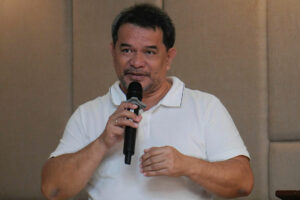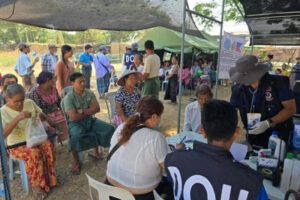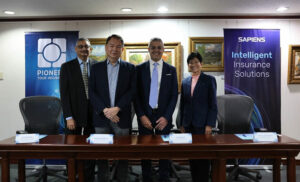Hope for 2025: Reform local, transform national

We say transformation in Philippine politics is not elusive, yet looking at the current lineup of senatorial candidates, it’s hard not to feel disheartened. Once again, familiar names dominate, and real hope for change feels distant. But maybe that’s the problem: we keep looking to national politics for solutions, when the real action — and the real potential for change — is at the local level.
Too often, we overlook local candidates, especially in small, rural towns where reforms are needed the most. The spotlight stays on big-city leaders like Mayor Vico Sotto, whose work in Pasig has shown what good governance can achieve. But if we want true national transformation, it can’t be just Vico. We need reformers winning everywhere — even in remote, rural towns far from the spotlight — where the need for change is just as (or perhaps more) urgent. Change doesn’t have to start from the top — it can grow from the ground up. And that means paying attention to leaders quietly working at the grassroots — those who aspire for public office not for recognition but to realize long-standing reforms. Time and again, they rally behind the call: win locally, transform nationally.
Eric Aseo is one of them. Eric, whom I worked with for a program on data-driven development, has spent around 30 years working with local government units (LGUs) across the country. His work with LGUs encompasses research, policy advocacy, procedural reform, and community development.
He has had a long experience in civil society. He has stepped into local politics after years of working behind the scenes as a reform advocate, a donor-partner representative, and an independent consultant to LGUs. Now, he has decided to throw his hat in the ring as a mayoralty candidate in San Julian, Eastern Samar, a fourth-class municipality. This is far from the spotlight. Just when we thought that he would end his colorful NGO career by doing farming and futures thinking, he surprised us with this decision to run for mayor.
A LIFETIME IN PUBLIC SERVICELocal governance is not new to Eric. As a young research assistant, he supported work in monitoring decentralization efforts just after the Local Government Code of 1991 was enacted. What seemed like a short, trivial role at the time sparked a deep interest in local development — one that would shape the rest of his career.
His succeeding engagements spanned administrative and policy support work at the provincial government of Eastern Samar, followed by a role at the League of Cities of the Philippines, where he coordinated a USAID-supported procedural reforms project across 16 Mindanao cities. He then joined The Asia Foundation-Philippines, as a local governance officer for two cycles of the Transparent Accountable Governance (TAG) Project. His expertise and good track record at the Foundation eventually led him to the frontlines of conflict management in Zamboanga, Sulu, and Basilan.
Then came Typhoon Yolanda in November 2013 — a turning point in his career that brought him home to Eastern Visayas. He resolved to focus his efforts on his home region, where, as he puts it, there is still so much to be done.
A CHAMPION FOR LOCAL DEVELOPMENTPost-Yolanda, Eric helped rebuild livelihoods for farmers and fisherfolk in southern Eastern Samar. He introduced alternative crops to coconut, like cacao, and championed inclusive market systems for small farmers. Afterward, he did freelance consulting with LGUs while serving on the Board of Regents of several universities in Eastern Visayas, representing the Senate Committee on Higher Education and TechVoc Education in institutions such as Southern Leyte State University, Eastern Visayas State University, Eastern Samar State University, Samar State University, Northwest Samar State University, and Visayas State University.
In 2021, Action for Economic Reforms brought him on board, and we became colleagues. Eric enjoyed the flexibility of freelance work, but he couldn’t resist the opportunity to work with LGUs, this time on something new: a data-driven development (3D) initiative. The program’s tripartite approach— a partnership of local government, the academe, and civil society — perfectly aligned with his advocacy: bridging the disconnect between academic research and the needs of LGUs and communities.
He was our policy lead in select local government units in Eastern Samar, Leyte, and the Sorsogon province. His proudest contribution is advancing 3D policymaking in LGUs by institutionalizing data-driven governance in agriculture, health, tourism, and disaster risk reduction and management.
Quite a lot for just two years, isn’t it? Imagine what he could do as mayor of San Julian.
ON THE CAMPAIGN TRAILRunning as an independent but with the support of incumbent councilors, his team anchors the campaign on a simple and powerful message — Pagkaon. Tubig. Pakabuhi (Food, Water, Livelihood) — the core needs of San Juliananons. The message resonates deeply.
Now on the campaign trail, he relies heavily on social media, the poor candidate’s medium of choice, he said.
But make no mistake: he is an astute strategist and a seasoned organizer, well-connected in government and the private sector.
Support has started to pour in through San Juliananons here and abroad, who are rallying behind him. A nurse overseas has covered the costs of the sound systems for campaign events. Others have paid for campaign materials — T-shirts, mugs, tote bags, tarpaulins, and even seedlings for farmers. One supporter is footing the bill for fuel. Many offer their homes, vehicles, time, and other resources to help the campaign forward.
I asked him: Why enter politics now, after all these years?
“Well, I’m a husband and father first,” he said. “I had to make sure my family was ready. They would have less of me once I finally hold public office.”
His children are now grown. His eldest, a former NEDA (National Economic and Development Authority) employee, is now a World Bank scholar at the prestigious University of Tokyo. His second child is in her third year studying Economics at Ateneo de Manila University.
Could Eric be San Julian’s best choice?
Eric’s candidacy reminds us that meaningful change often begins in places where it is most unknown and difficult — and most needed. Small towns like San Julian face steeper challenges than their urban counterparts, grappling with limited resources, inadequate technical capacity, and limited access to support networks. Reform in these contexts requires not only vision but also grit, creativity, and deep local knowledge. Eric certainly brings knowledge, experience, and a vast network — resources he’s eager to use to spur and sustain San Julian’s development.
And oh! Masaya din siyang ka-kape (he is fun to share coffee with)!
But if you ask him about farming, be ready — he can talk about it endlessly. Then again, you’re in luck, because you’ll find yourself drawn into deep discussions about poverty, philosophy, and poetry. And he listens with intent, speaks with purpose, and always leaves you with something to reflect on. San Julian is fortunate to have his full attention now.
Allow him to give back before he takes to farming full-time.
Daffodil Santillan is a data and research consultant at Action for Economic Reforms. She was formerly AER’s Data Officer for its Coalescing Organizations Towards Locally Led Actions to Boost Development (COLLABDev) project.




